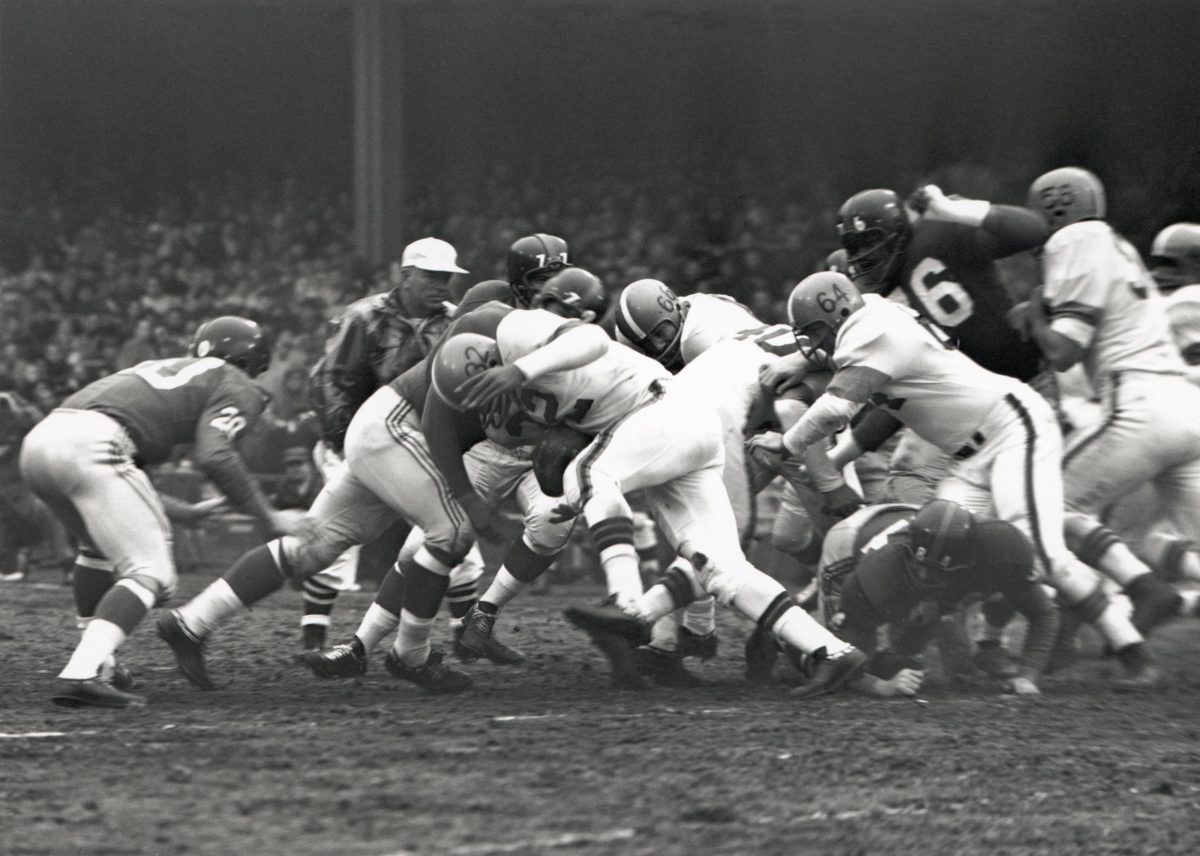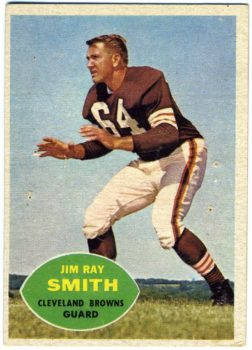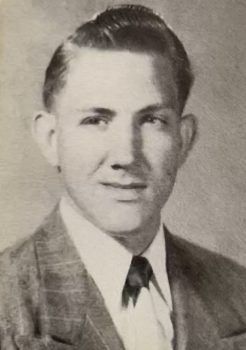![]()
By Tracy Gupton
Columbia Historical Museum Board Member
The Columbia Roughnecks are in their 101st season and one of the school’s biggest stars, James Ray Smith, 90, reflects on his nine-year, pro career and his illustrious collegiate and high school gridiron days.
When the discussion surrounds who is the greatest Roughnecks football player of all time, there are several names bandied about, but the debate must begin with Smith. The 1950 graduate of West Columbia High School is the only Roughneck to be an All American in college and a three-time, NFL All-Pro first-team selection.
He is most likely the only West Columbian to have appeared on The Ed Sullivan Show. That occurred in December 1953 when Sullivan, whose popular CBS variety show later introduced the nation to Elvis Presley and The Beatles, presented Collier’s All American college football players on his “Toast of the Town”.
Smith said he wore his Baylor Bears number 70 uniform in the New York City TV studio and posed for pictures with other 1953 college All Americans there, including Heisman Trophy winner Johnny Lattner, a Notre Dame running back, and Minnesota quarterback Paul Giel, runner-up in the Heisman voting that year.
In 2007, Smith and three former Roughnecks who also played in the NFL—Dennis Gaubatz, Charlie Davis and Charlie Johnson—comprised the inaugural class of the Roughnecks Sports Hall of Honor.
Smith was inducted into the Texas Sports Hall of Fame in 2013, the Cleveland Browns Legends Hall of Fame in 2005, the College Football Hall of Fame in 1987 and the Baylor University Athletics Hall of Fame in 1968.
The NFL Pro Football Hall of Fame eludes him.
“It doesn’t hurt that much if I don’t make it, but it would sure be nice,” Smith said.
Cleveland Browns Hall of Fame running backs Jim Brown and Bobby Mitchell credited the blocking of offensive linemen such as Smith and fellow Hall of Famers Lou Groza and Gene Hickerson for opening holes and throwing key blocks. Those plays were vital to Brown and Mitchell posting such gaudy stats toting the football for legendary head coach Paul Brown in the late 1950s and early 1960s.
Smith’s memory remains sharp, as he reels off scores from nearly 75 years ago. The battle scars have taken their toll.
“I’ve had four shoulder replacement surgeries,” he said. “I’ve broken both of my hands, had two knee operations and two concussions.”
Because of injuries, Smith only played eight games for coach Tom Landry’s Cowboys in 1963 and was limited to four regular season games in 1964.
“I hurt my knee in the first game of the season in 1964,” Smith said.
He claims that Paul Brown informed him that he was the highest paid offensive lineman in the NFL with Cleveland at the end of his tenure with the Browns and continued to be when he switched uniforms following a trade to the Dallas Cowboys prior to the 1963 season. Smith said he still was not making much money as a pro football player and multiple injuries ended his career at the conclusion of the 1964 season, a season that saw his former team, the Cleveland Browns, win the league championship without him.
In 1954, the Browns used a “future draft pick” on Smith who was in the midst of his All-American college career in Waco.
A two-way lineman at Baylor, Smith was named first team All-Southwest Conference in 1953 and 1954, as well as second team All American in 1954 a year after achieving first team All American accolades the previous season at Baylor.
Smith claims he was more impressive in front of the pro scouts in the 1955 Senior Bowl and had a chance to show off in front of his future pro teammates at the Aug. 12, 1955, College All Star Game when he helped the college All Stars defeat the NFL champion Cleveland Browns 30-27.
He recalls he also represented West Columbia in the high school all star game in the summer of 1950 when Smith’s South All Stars defeated the North 25-0 prior to his decision to take his gridiron skills to Waco.
Smith told Browns Nation reporter Jimmy Swartz in a 2021 interview that “my mother always wanted me to finish high school. No one in my family on either side had gone past the sixth grade. Well, my brother and I and our sister all graduated from high school and we went on to college and got our degrees. If it hadn’t been for football, I would never have gone to college without a scholarship.”
Smith was a multi-sport standout as a Roughneck. He excelled in basketball and baseball at West Columbia High School in the late 1940s and went to state in track where he competed in the shot put and discus at Austin.
“I won district my junior and senior years in shot put, discus and the high jump,” Smith said. “I jumped six-one or six-two in the high jump which was good enough to win our district.”
The highlight of his high school football career in West Columbia was the Roughnecks’ victory over the El Campo Ricebirds his senior year in 1949.
“El Campo beat everybody my junior year, and we lost to them 72-0 my sophomore year.” Although that win was sweet revenge, Smith boasts about the best game he ever played as a Roughneck.
In a game against Deer Park at Griggs Field, James Ray scored five touchdowns from his fullback position, two on pass plays and three running the ball, he recalls.
Smith lost both of his parents when they were relatively young and is saddened to be the only one of their children remaining. He said he was the middle child and has lost his older brother Edward Smith, a 1947 graduate of WCHS, and their younger sister.
He is presently caring for his wife Paula who recently broke her leg. They married as students at Baylor University. They have two sons—Ray and Brad —and a daughter, Ripple Terrell.
Since retiring from pro football, Smith has been involved in real estate in the Dallas area and has served as the president of both the Baylor Lettermen’s Club and the Cotton Bowl Association.
So it was extra special for Smith when he got to see his oldest son Ray play defensive end for the Baylor Bears in the 1980 Cotton Bowl in Dallas. As president of the Cotton Bowl, Smith, former Roughnecks standout, would present the Cotton Bowl championship trophy to the winning team’s coach.


Jim Ray Smith (#64) blocks for a Dallas Cowboys running back in either 1963 or 1964.

Jim Ray Smith (at right) blocking for the Cleveland Browns #32 Jim Brown, an NFL Hall of Famer who later became a movie star and Civil Rights leader in the 1960s.

Topps football card of Jim Ray Smith


James Ray Smith
